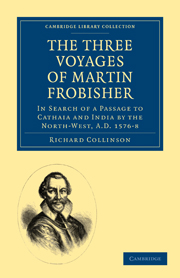 The Three Voyages of Martin Frobisher
The Three Voyages of Martin Frobisher Book contents
- Frontmatter
- INTRODUCTION
- SIR MARTIN FROBISHER, KNT
- STATE PAPERS PREVIOUS TO THE FIRST VOYAGE
- WHAT COMMODITIES AND INSTRUCTIONS MAY BE REAPED BY DILIGENT READING THIS DISCOURSE
- TO THE RIGHT HONOURABLE, MY SINGULAR GOOD MAYSTER, SIR CHRISTOPHER HATTON, KNIGHT, CAPTAINE OF THE QUEENES MAJESTIES GARDE, VIZCHAMBERLAINE TO HIR HIGHNESSE, AND ONE OF HIR MAJESTIES MOST HONOURABLE PRIVIE COUNSALE
- THE PRINTER TO THE READER
- THE FYRST BOOKE OF THE FIRST VOYAGE OF MARTIN FROBISHER, ESQUIER, CAPTAYNE GENERALL FOR THE DISCOVERIE OF THE PASSAGE TO CATAYA AND THE EAST INDIA, BY THE NORTHWEAST, FIRST ATTEMPTED IN ANNO DOM. 1576, THE 15. OF MAY
- STATE PAPERS SUBSEQUENT TO THE FIRST VOYAGE
- ACCOUNT OF THE SECOND VOYAGE, WITH THE INSTRUCTIONS GIVEN TO MARTYNE FURBISHER
- A TRUE REPORTE OF SUCH THINGS AS HAPNED IN THE SECOND VOYAGE OF CAPTAYNE FROBYSHER, PRETENDED FOR THE DISCOVERIE OF A NEW PASSAGE TO CATAYA, CHINA, AND THE EAST INDIA, BY THE NORTH WEST. ANNO DO. 1577
- STATE PAPERS SUBSEQUENT TO THE SECOND VOYAGE
- STATE PAPERS RELATIVE TO THE TRIAL OF THE ORE SUBSEQUENT TO THE SECOND VOYAGE
- STATE PAPERS CONCERNING THE TRIALL OF THE EWR PREVIOUS TO THE THIRD VOYAGE
- STATE PAPERS RELATIVE TO THE OUTFIT FOR THE THIRD VOYAGE
- THE THIRDE VOYAGE OF CAPTAINE FROBISHER, PRETENDED FOR THE DISCOVERIE OF CATAYA, BY META INCOGNITA. ANNO DO. 1578
- ANOTHER ACCOUNT OF THE THIRD VOYAGE, BY EDWARD SELLMAN
- STATE PAPERS SUBSEQUENT TO THE THIRD VOYAGE
- A DESCRIPTIVE CATALOGUE OF RELICS OF FROBISHER'S EXPEDITIONS TO THE ARCTIC REGIONS IN THE YEARS 1576-7-8
- INDEX
- Plate section
WHAT COMMODITIES AND INSTRUCTIONS MAY BE REAPED BY DILIGENT READING THIS DISCOURSE
Published online by Cambridge University Press: 05 July 2011
- Frontmatter
- INTRODUCTION
- SIR MARTIN FROBISHER, KNT
- STATE PAPERS PREVIOUS TO THE FIRST VOYAGE
- WHAT COMMODITIES AND INSTRUCTIONS MAY BE REAPED BY DILIGENT READING THIS DISCOURSE
- TO THE RIGHT HONOURABLE, MY SINGULAR GOOD MAYSTER, SIR CHRISTOPHER HATTON, KNIGHT, CAPTAINE OF THE QUEENES MAJESTIES GARDE, VIZCHAMBERLAINE TO HIR HIGHNESSE, AND ONE OF HIR MAJESTIES MOST HONOURABLE PRIVIE COUNSALE
- THE PRINTER TO THE READER
- THE FYRST BOOKE OF THE FIRST VOYAGE OF MARTIN FROBISHER, ESQUIER, CAPTAYNE GENERALL FOR THE DISCOVERIE OF THE PASSAGE TO CATAYA AND THE EAST INDIA, BY THE NORTHWEAST, FIRST ATTEMPTED IN ANNO DOM. 1576, THE 15. OF MAY
- STATE PAPERS SUBSEQUENT TO THE FIRST VOYAGE
- ACCOUNT OF THE SECOND VOYAGE, WITH THE INSTRUCTIONS GIVEN TO MARTYNE FURBISHER
- A TRUE REPORTE OF SUCH THINGS AS HAPNED IN THE SECOND VOYAGE OF CAPTAYNE FROBYSHER, PRETENDED FOR THE DISCOVERIE OF A NEW PASSAGE TO CATAYA, CHINA, AND THE EAST INDIA, BY THE NORTH WEST. ANNO DO. 1577
- STATE PAPERS SUBSEQUENT TO THE SECOND VOYAGE
- STATE PAPERS RELATIVE TO THE TRIAL OF THE ORE SUBSEQUENT TO THE SECOND VOYAGE
- STATE PAPERS CONCERNING THE TRIALL OF THE EWR PREVIOUS TO THE THIRD VOYAGE
- STATE PAPERS RELATIVE TO THE OUTFIT FOR THE THIRD VOYAGE
- THE THIRDE VOYAGE OF CAPTAINE FROBISHER, PRETENDED FOR THE DISCOVERIE OF CATAYA, BY META INCOGNITA. ANNO DO. 1578
- ANOTHER ACCOUNT OF THE THIRD VOYAGE, BY EDWARD SELLMAN
- STATE PAPERS SUBSEQUENT TO THE THIRD VOYAGE
- A DESCRIPTIVE CATALOGUE OF RELICS OF FROBISHER'S EXPEDITIONS TO THE ARCTIC REGIONS IN THE YEARS 1576-7-8
- INDEX
- Plate section
Summary
1. First, by example may be gathered, how a discoverer of new countries is to proceede in his first attempt of any discoverie.
2. Item, how he shoulde be provided of shipping, victuals, munition, and choice of men.
3. Howe to proceede and deale with straunge people, be they never so barbarous, cruell and fierce, eyther by lenitie or otherwise.
4. How trade of marchandize may be made withoute money.
5. How a pilot may deale, being environed wyth mountaines of ise in the frosen sea.
6. How lengths of dayes, chaunge of seasons, sommers and winters, do differ in sundry regions.
7. How dangerous it is to attempt new discoveries, either for the length of the voyage or the ignorance of the language, the want of interpretors, newe and unaccustomed elementes and ayres, straunge and unsavery meats, daunger of theeves and robbers, fiercenesse of wilde beasts and fishes, hugenesse of wooddes, daungerousnesse of seas, dreade of tempestes, feare of hidden rockes, steepenesse of mountaines, darknesse of sodaine falling fogges, continuall paines taking withoute anye reste, and infinite others.
8. How pleasaunt and profitable it is to attempt new discoveries, either for the sundry sights and shapes of strange beastes and fishes, the wonderful workes of nature, the different manners and fashions of diverse nations, the sundry sortes of gouernmente, the sight of straunge trees, fruite, foules, and beastes, the infinite treasure of pearle, gold and silver, the newes of new found landes, the sundry positions of the sphere, and many others.
- Type
- Chapter
- Information
- The Three Voyages of Martin FrobisherIn Search of a Passage to Cathaia and India by the North-West, A.D. 1576–8, pp. 13 - 16Publisher: Cambridge University PressPrint publication year: 2010First published in: 1867


